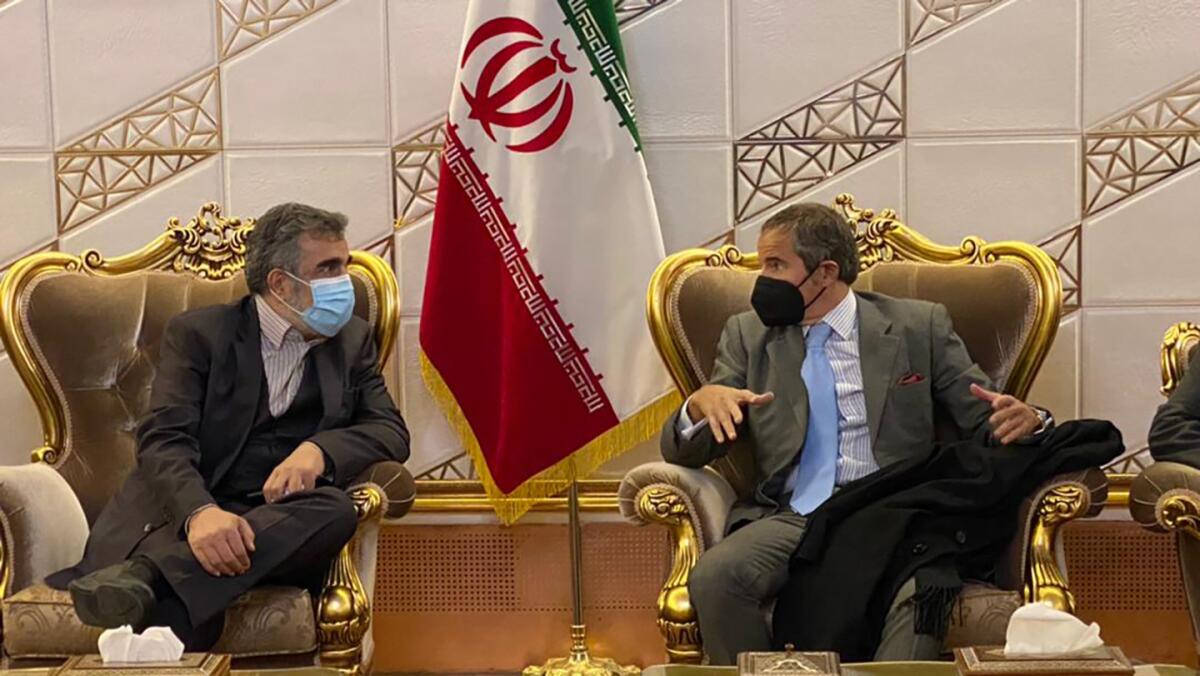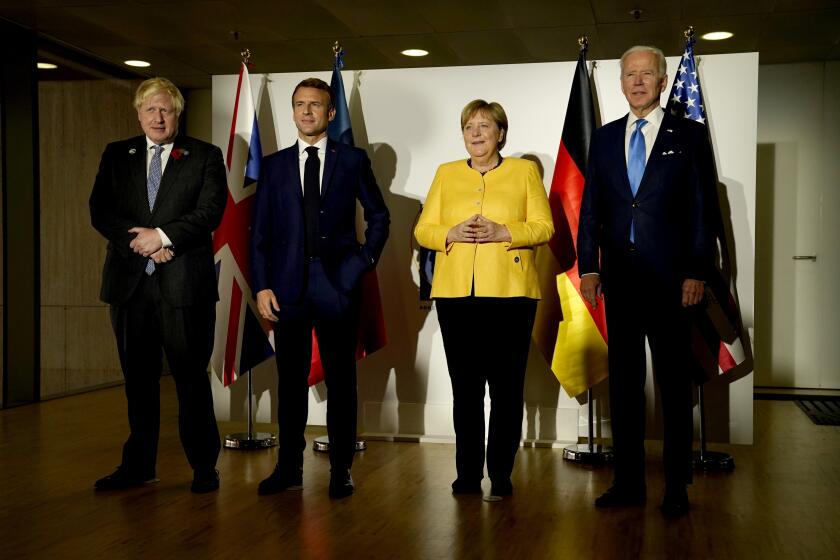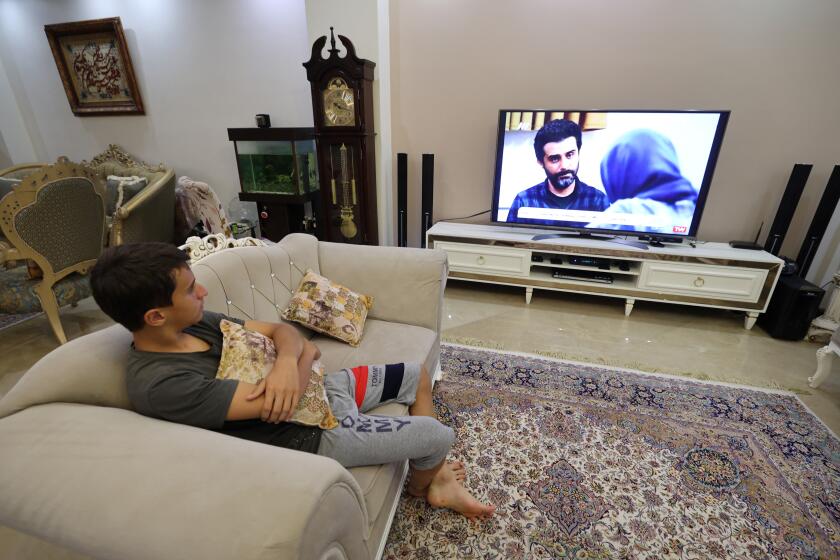U.N. nuclear watchdog chief presses for more access in Iran

- Share via
TEHRAN — The head of the United Nations’ atomic watchdog met Tuesday with Iranian officials to press for greater access in the Islamic Republic on the eve of diplomatic talks restarting over Tehran’s tattered nuclear deal with world powers.
Rafael Grossi of the International Atomic Energy Agency yet again faces tightrope-style talks with Iranian officials as his inspectors remain unable to access surveillance footage and face greater challenges in trying to monitor Tehran’s rapidly growing uranium stockpile. In the wake of then-President Trump’s unilateral withdrawal from Iran’s deal, the Islamic Republic now enriches small amounts of uranium up to 60% purity — its highest ever and close to weapons-grade levels of 90%.
While Iran maintains its program is peaceful, regional rival Israel has repeatedly warned it won’t allow Tehran to build a nuclear weapon and is suspected of launching attacks targeting its program as part of a wider regional shadow war playing across the Mideast in recent years. The U.S. under President Biden, meanwhile, has said it’s willing to return to the deal, but has warned time is running out.
President Biden, meeting with European leaders to plot strategy for nuclear talks with Iran, offers to lift sanctions if Tehran ‘changes course.’
All this raises the risk of a wider confrontation with Iran, which has taken a harder tack ahead of the talks under new President Ebrahim Raisi, a protégé of Supreme Leader Ayatollah Ali Khamenei.
Writing on Twitter on Monday, Grossi said he hoped to “address outstanding questions” with Iranian officials.
“I hope to establish a fruitful and cooperative channel of direct dialogue so the [IAEA] can resume essential verification activities in the country,” Grossi wrote.
On Tuesday, Grossi went to the Atomic Energy Organization of Iran, the country’s civilian nuclear agency, for his third such visit since February. He spoke with Mohammad Eslami, the new head of the organization. The U.N. in 2008 sanctioned Eslami for “being engaged in, directly associated with or providing support for Iran’s proliferation sensitive nuclear activities or for the development of nuclear weapon delivery systems.”
After their talk, Eslami gave a news conference in which he described the ongoing issues as “technical” and not governed by the “political issues and conspiracies” of Iran’s enemies.
“Some parts are yet to be answered and some parts have to do with issues that have already been closed in the past,” he said. “They have been addressed in the nuclear deal and have been closed. Today, we agreed to put an end to them.”
Eslami did not elaborate.
Grossi for his part described the talks as “intense” and was not as definitive as Eslami.
“We are continuing at this point our negotiations with a view to finding common ground,” Grossi said. He was due to meet Iranian Foreign Minister Hossein Amirabdollahian afterward.
‘Gando,’ a ‘Homeland’-like hit TV series in Iran, is a sophisticated ploy by ultra-conservatives to torpedo delicate nuclear talks with the West.
Under a confidential agreement called an “Additional Protocol” with Iran, the IAEA collects and analyzes images from a series of surveillance cameras installed at Iranian nuclear sites. Those cameras helped it monitor Tehran’s program to see if it is complying with the nuclear deal.
Iran’s hard-line parliament in December 2020 approved a bill that would suspend part of U.N. inspections of its nuclear facilities if European signatories did not provide relief from oil and banking sanctions by February. Since February, the IAEA has been unable to access imagery from those cameras.
Under the deal, the IAEA also placed around 2,000 tamper-proof seals on nuclear material and equipment. Those seals communicated electronically to inspectors. Automated measuring devices also provided real-time data from the program. Inspectors haven’t been able to access that data either, making the task of monitoring Iran’s enriched uranium stockpile that much more difficult.
The agency also has sought monitoring of activities at a centrifuge parts production site near northern city of Karaj. The IAEA has had no access there since June after Iran said a sabotage attack by Israel considerably damaged the facility and an IAEA camera there.
In a separate report to IAEA member states earlier this month, the agency said Grossi also was concerned about inspectors “being subjected to excessively invasive physical searches by security officials at nuclear facilities in Iran.”
Tuesday’s meeting comes ahead of a wider meeting of the IAEA member states. Iran avoided facing a censure vote at the board with a similar Grossi visit in September.
Meanwhile in Israel, Prime Minister Naftali Bennett described Iran’s nuclear program as being in a “very advanced stage,” without providing details. Ahead of the resumption of nuclear talks between global powers and Iran, Bennett said he expects “disagreement with our greatest of friends.”
“Either way, even with the return to an agreement, Israel is of course not part of the agreement. Israel is not bound by it,” he told a security conference in Herzliya. “We will maintain our freedom to act.”
Associated Press writer Tia Goldenberg in Tel Aviv contributed to this report. Gambrell reported from Dubai, United Arab Emirates.
More to Read
Sign up for Essential California
The most important California stories and recommendations in your inbox every morning.
You may occasionally receive promotional content from the Los Angeles Times.












